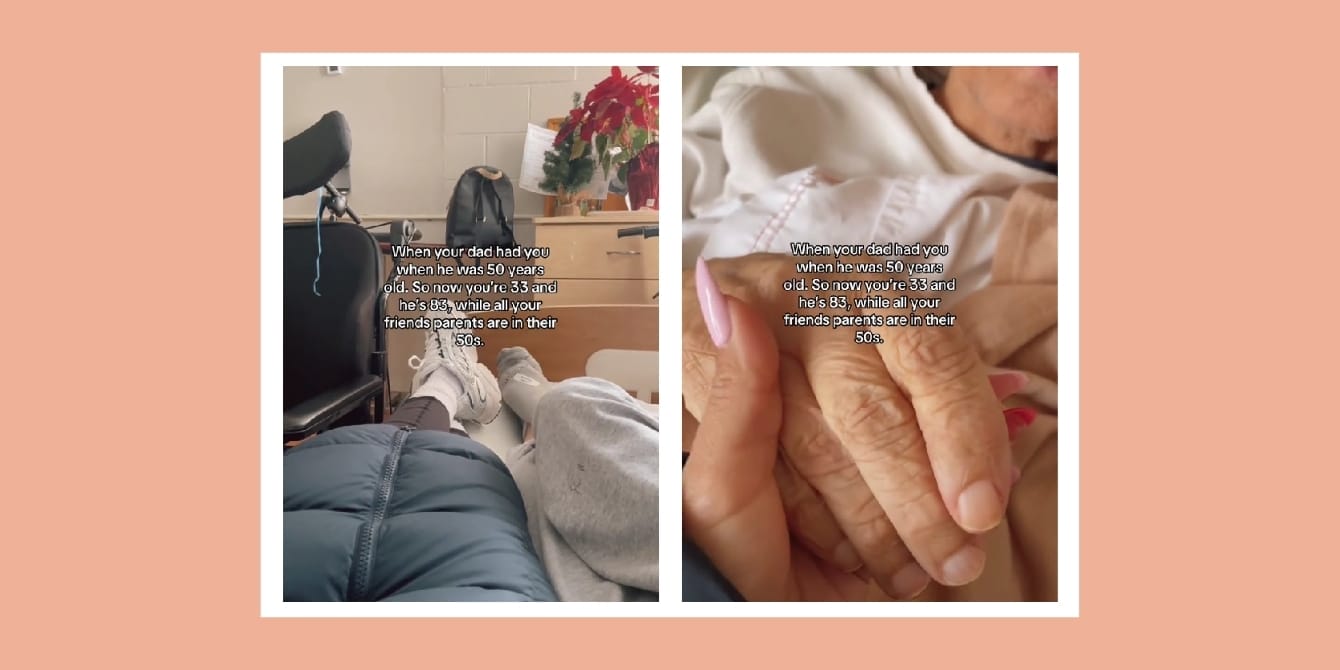What’s it like to be a Millennial and have an elderly parent? Yasmeen Messrie’s viral TikTok video just put this experience into the spotlight. In the clip, she casually drops, “When your dad had you he was 50 years old. So now you’re 33 and he’s 83 while all your friends’ parents are in their 50s.”
Cue the flood of emotional and relatable comments from millennials reflecting on the joys and challenges of growing up with older parents.
@yasmeenmessrie #olderparents #millennialproblems ♬ оригинальный звук – .
The video has over 7 million views and has racked up thousands of comments, turning into an impromptu support group for Millennials with older parents. Some users shared heartwarming sentiments, like “Better to have a good dad for 30 years than a bad one for 50,” while others pointed out the reality check: “We get them for however long we get them. Being young doesn’t guarantee more time.”
Messrie’s TikTok is more than just a heartwarming clip; it reflects a growing cultural shift. Millennials are increasingly becoming part of the so-called sandwich generation Pew Research, juggling caregiving for aging parents while raising young kids.
The term refers to people, typically in their 30s to 50s, who find themselves “sandwiched” between caring for both their children and elderly parents. This dual responsibility can often lead to emotional, physical, and financial strain.
According to Mental Health America, approximately 23% of U.S. adults are part of the “sandwich generation,” simultaneously raising children and supporting aging parents.
The pros and cons of having older parents
Messrie’s video also reignited the debate: Is having an older dad a blessing or a challenge? The TikTok comments section had thoughts:
- Pro: Older parents often bring financial stability and wisdom. “Older dad has more resources, calmer, more stable, and wiser… hopefully.” – @BAirFrying
- Con: The anxiety of losing them sooner is real. “Can we talk about the crippling anxiety that accompanies this?” – @nikki
- Reality Check: No one is guaranteed time, no matter their parents’ age. “My dad had me late, but I cherished the 23 years I had with him.” – @Brittany
Related: “We’re pregnant in our 40s!”: Viral pregnancy announcement sparks conversation about motherhood later in life
The emotional and practical challenges of being part of the sandwich generation
Messrie’s TikTok video also highlights the growing realities of elder care, particularly for Millennial moms who are often tasked with this responsibility. Whether you’re managing the emotional weight of caregiving or feeling the pressure to balance it all, the reality is that caregiving for aging parents—while also raising children—is increasingly becoming the norm.
More millennials are navigating elder care while raising their own children, leading to a surge in multi-generational living and the stress of dual responsibilities. It is a heavy burden that often falls to the daughter in the family to manage. With rising healthcare costs and longer life expectancies, balancing parenthood with caregiving is becoming the norm.
Messrie’s video is part of a larger cultural shift around caregiving, one that many Millennial moms are intimately familiar with. While it can feel overwhelming to be in the sandwich generation, there are resources that can help. The AARP Family Caregiving Guide and the National Alliance for Caregiving offer practical advice for juggling caregiving responsibilities while raising your own children.
Whether your dad had you at 25 or 55, one thing is clear: Time is precious. Being a Millennial mom with an aging parent comes with unique challenges, but it also offers the opportunity to cherish every moment. If you’re part of the “old dad club” or managing life in the sandwich generation, remember—you’re not alone. The viral support Messrie’s post has generated proves that there’s a community of people navigating this, just like you.
Related: Supporting working parents is good for business, full stop
Sources:
- The Sandwich Generation. The Pew Research Center. The Sandwich Generation.
- Caregiving in The US. Caregiving. Caregiving in The US.
- Family Caregiving. AARP. Family Caregiving.
- Coping strategies of the sandwich generation. BMC Public Health. Coping strategies of the sandwich generation in the care process: a qualitative study.
- Caregiving and the Sandwich Generation. Mental Health America. Caregiving and the Sandwich Generation.

